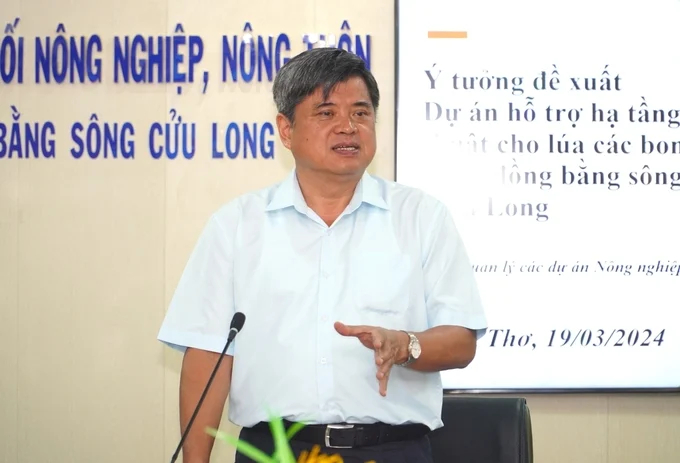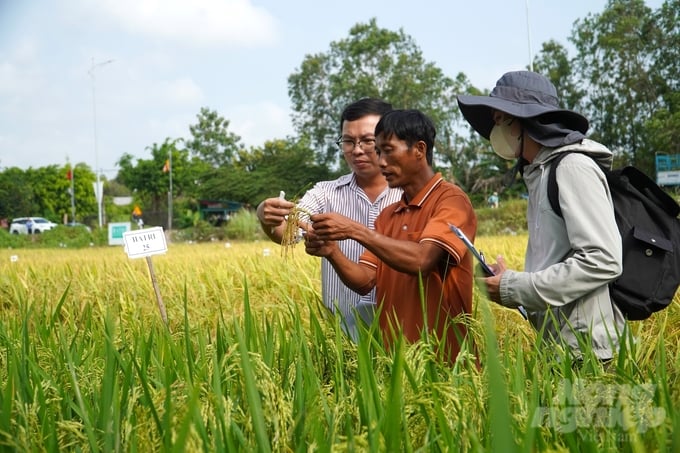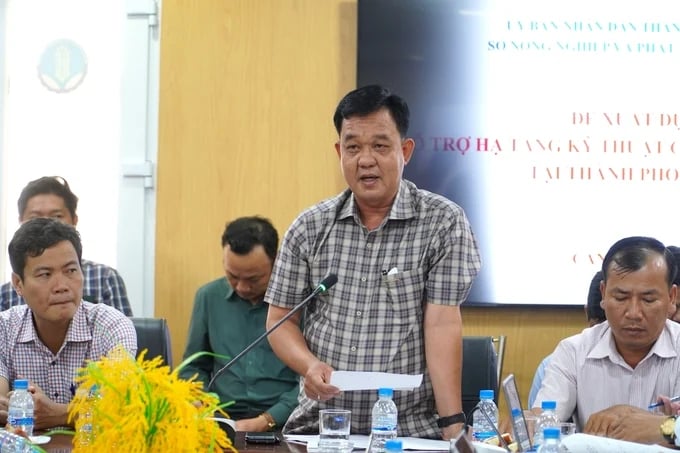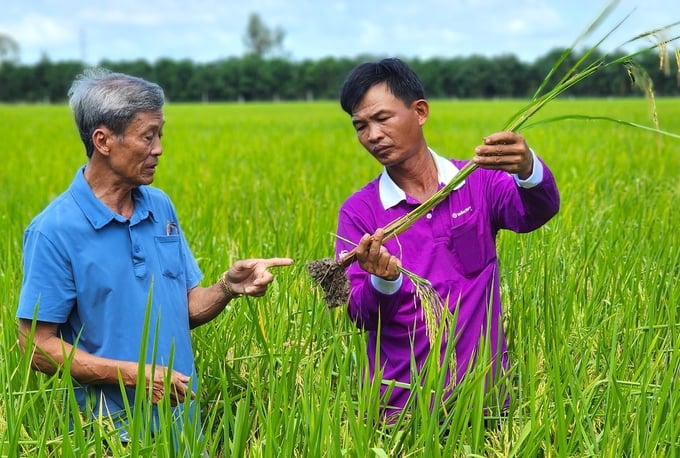May 18, 2025 | 02:04 GMT +7
May 18, 2025 | 02:04 GMT +7
Hotline: 0913.378.918
May 18, 2025 | 02:04 GMT +7
Hotline: 0913.378.918
On March 19th, in Can Tho City, Deputy Minister of Agriculture and Rural Development Tran Thanh Nam presided over a meeting to deliberate on the proposal of the Technical Infrastructure Support Project for Low-Carbon Rice in the Mekong Delta (PDO Project).
The project is designed to advance low-carbon, high-quality rice production across 12 provinces and cities in the Mekong Delta region participating in the Greening the Mekong Delta Sustainable Development Project. By 2030, the project aims to cultivate 1 million hectares of high-quality, low-emission rice.

Deputy Minister of Agriculture and Rural Development Tran Thanh Nam leading a conference to solicit feedback on the Technical Infrastructure Support Project for Low-Carbon Rice in the Mekong Delta (PDO). Photo: Kim Anh.
Deputy Minister Tran Thanh Nam emphasized that the agricultural extension force will serve as the linchpin at the grassroots level for the 1 million hectares of high-quality rice project. This force will be pivotal in liaising with cooperatives to oversee, assess, and report on emission reduction indicators and techniques.
Consequently, the Deputy Minister urged localities to reinforce agricultural extension forces in the region promptly. Moreover, investment proposals in four key areas should be prioritized: irrigation systems, inter-regional transportation, logistics, and comprehensive mechanization.
The Deputy Minister proposed selecting 5 provinces and cities representing diverse soil and land characteristics in the Mekong Delta to initiate a pilot model, encompassing the entire farming process until carbon credits are measured. These provinces and cities include Can Tho City, Soc Trang, Kien Giang, Dong Thap, and Tra Vinh. Following three pilot seasons, specialized agencies of the Ministry of Agriculture and Rural Development will make necessary adjustments, leading to the issuance of an official document recognizing the emission reduction measurement process and subsequently expanding it to other locales.

The agricultural extension force will serve as the core team at the grassroots level in the 1 million hectares of high-quality rice project. Photo: Kim Anh.
As a pivotal rice-growing region, Kien Giang currently boasts 12 out of 15 districts and 102 cooperatives registered to participate in the 1 million hectares of high-quality rice project. With proactive preparation, the province has established a Steering Committee for the project, chaired by a Vice Chairman of the Kien Giang Provincial People's Committee. Simultaneously, all departments and localities have been organized to collaborate effectively.
In the PDO Project, Kien Giang province has proposed prioritizing investment in infrastructure components such as irrigation and pumping stations to address local agricultural challenges. Additionally, the province focuses on supporting logistics infrastructure to enhance connectivity within and beyond cooperatives and across provinces.
Mr. Le Huu Toan, Director of the Kien Giang Department of Agriculture and Rural Development, stressed the crucial role of agricultural extension as the core force in the PDO project. He emphasized the necessity for comprehensive attention and capacity building within the grassroots agricultural extension system.
In Soc Trang province, Mr. Huynh Ngoc Nha, Director of Soc Trang Department of Agriculture and Rural Development, affirmed that agricultural extension is a vital resource for agricultural development. Currently, the province's agricultural extension system has reached the commune level. The province is actively seeking solutions to establish policy mechanisms that encourage the development of this force.

Mr. Huynh Ngoc Nha, Director of the Department of Agriculture and Rural Development of Soc Trang province, highlighted that the locality has established an agricultural extension system up to the commune level. Photo: Kim Anh.
Initially, Soc Trang province invites commune-level leaders or voluntary individuals to join community agricultural extension groups, operating with a spirit of shared responsibility. Moving forward, the province plans to implement policy mechanisms to provide support for these groups.
As per the proposed plan by the Agricultural Project Management Board (Ministry of Agriculture and Rural Development), the PDO Project will comprise three components aimed at providing a comprehensive and strategic investment package for farmers, including support for production by fostering the development and strengthening of farmer organizations and cooperatives; creating a conducive policy and technical framework to aid rice production in emissions reduction; and infrastructure investment alongside non-construction activities.
Component 1 will focus on developing a high-quality, low-carbon rice value chain covering approximately 500,000 hectares of rice production in participating localities of the 1 million hectares of high-quality rice project. Key activities under this component include upgrading irrigation systems; promoting digital agriculture; enhancing rice value chain infrastructure; implementing green energy infrastructure; improving transportation systems; and developing online and e-commerce platforms.

The PDO project aims to provide a comprehensive and strategic investment package to develop high-quality rice value chains. Photo: Kim Anh.
Component 2 involves the implementation of technical development and transfer. This component encompasses various support areas, including research, development, and transfer of new seeds adaptable to climate change and low carbon; technological advancements; electronic agricultural extension services; restructuring of farmers' production methods; and support for circular agricultural production to manage by-products and reduce waste.
Lastly, component 3 focuses on project management tasks, supporting project coordination, monitoring, and evaluation.
The estimated investment cost for the PDO Project is 375 million USD. Of this, 360 million USD will be sourced from a loan from the World Bank, with the remaining 15 million USD provided as counterpart capital from contributions by the Government and localities.
The Ministry of Agriculture and Rural Development will serve as the managing agency and overall coordinator of the entire project. Provincial People's Committees will act as managing agencies for the provincial components and oversee investment activities at the provincial level.
Translated by Quynh Chi

(VAN) Minister of Agriculture and Environment Do Duc Duy held a meeting with Soopakij Chearavanont, Chairman of C.P. Group, on May 15.
/2025/05/16/3800-0-nongnghiep-143756.jpg)
(VAN) Suntory PepsiCo Vietnam coordinated with the Ministry of Education and Training to implement an education program on water conservation, reaching nearly 1 million primary school students nationwide.

(VAN) Vietnam’s TH Group officially put its high-tech fresh milk processing plant into operation in the Russian Federation, marking a historic moment as the first TH true MILK cartons were produced in Russia.

(VAN) Use of high-quality broodstock and biotechnology is regarded as the most effective approach to ensuring sustainable and economically viable shrimp aquaculture ahead of climate change and the emergence of increasingly intricate disease patterns.

(VAN) Carbon farming is a form of agricultural practices that helps absorb more greenhouse gases than it emits, through smart management of soil, crops, and livestock.

(VAN) This is a key content of the Memorandum of Understanding recently signed between the Vietnam Fisheries Society and Kunihiro Inc of Japan.

(VAN) To achieve the goal, local authorities and businesses in Kon Tum province have fully prepared the necessary conditions for the new Ngoc Linh ginseng planting season.